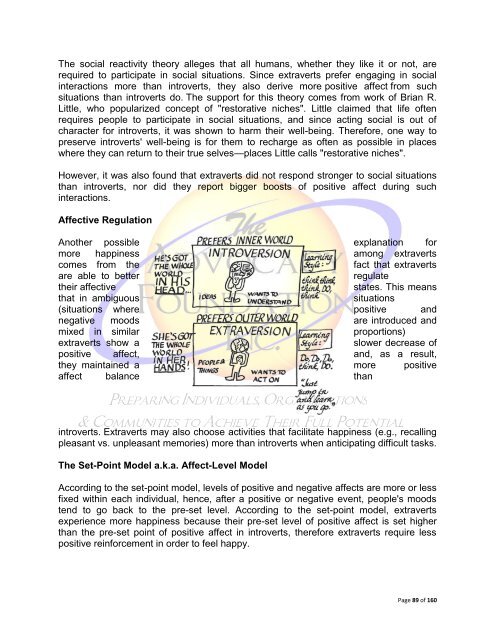The Gift of Introversion
The Gift of Introversion
The Gift of Introversion
You also want an ePaper? Increase the reach of your titles
YUMPU automatically turns print PDFs into web optimized ePapers that Google loves.
<strong>The</strong> social reactivity theory alleges that all humans, whether they like it or not, are<br />
required to participate in social situations. Since extraverts prefer engaging in social<br />
interactions more than introverts, they also derive more positive affect from such<br />
situations than introverts do. <strong>The</strong> support for this theory comes from work <strong>of</strong> Brian R.<br />
Little, who popularized concept <strong>of</strong> "restorative niches". Little claimed that life <strong>of</strong>ten<br />
requires people to participate in social situations, and since acting social is out <strong>of</strong><br />
character for introverts, it was shown to harm their well-being. <strong>The</strong>refore, one way to<br />
preserve introverts' well-being is for them to recharge as <strong>of</strong>ten as possible in places<br />
where they can return to their true selves—places Little calls "restorative niches".<br />
However, it was also found that extraverts did not respond stronger to social situations<br />
than introverts, nor did they report bigger boosts <strong>of</strong> positive affect during such<br />
interactions.<br />
Affective Regulation<br />
Another possible explanation for<br />
more happiness among extraverts<br />
comes from the<br />
fact that extraverts<br />
are able to better<br />
regulate<br />
their affective<br />
states. This means<br />
that in ambiguous<br />
situations<br />
(situations where positive and<br />
negative moods are introduced and<br />
mixed in similar<br />
proportions)<br />
extraverts show a<br />
slower decrease <strong>of</strong><br />
positive affect, and, as a result,<br />
they maintained a more positive<br />
affect balance than<br />
introverts. Extraverts may also choose activities that facilitate happiness (e.g., recalling<br />
pleasant vs. unpleasant memories) more than introverts when anticipating difficult tasks.<br />
<strong>The</strong> Set-Point Model a.k.a. Affect-Level Model<br />
According to the set-point model, levels <strong>of</strong> positive and negative affects are more or less<br />
fixed within each individual, hence, after a positive or negative event, people's moods<br />
tend to go back to the pre-set level. According to the set-point model, extraverts<br />
experience more happiness because their pre-set level <strong>of</strong> positive affect is set higher<br />
than the pre-set point <strong>of</strong> positive affect in introverts, therefore extraverts require less<br />
positive reinforcement in order to feel happy.<br />
Page 89 <strong>of</strong> 160

















